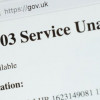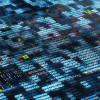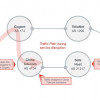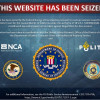Anti-Attack Feds Push Carnivore
WASHINGTON -- Federal police are reportedly increasing Internet surveillance after Tuesday's deadly attacks on the World Trade Center and the Pentagon.
Just hours after three airplanes smashed into the buildings in what some U.S. legislators have dubbed a second Pearl Harbor, FBI agents began to visit Web-based, e-mail firms and network providers, according to engineers at those companies who spoke on condition of anonymity.
An administrator at one major network service provider said that FBI agents showed up at his workplace on Tuesday "with a couple of Carnivores, requesting permission to place them in our core, along with offers to actually pay for circuits and costs."
The person declined to say for publication what the provider's response was, "but a lot of people" at other firms were quietly going along with the FBI's request. "I know that they are getting a lot of 'OKs' because they made it a point to mention that they would only be covering our core for a few days, while their 'main boxes were being set up at the Tier 1 carriers' -- scary," the engineer said.
The FBI's controversial Carnivore spy system, which has been renamed DCS1000, is a specially configured Windows computer designed to sit on an Internet provider's network and monitor electronic communications. To retrieve the stored data, an agent stops by to pick up a removable hard drive with the information that the Carnivore system was configured to record.
Microsoft's Hotmail service has also been the target of increased federal attention, according to an engineer who works there.
"Hotmail officials have been receiving calls from the San Francisco FBI office since mid-(Tuesday) morning and are cooperating with their expedited requests for information about a few specific accounts," the person said. "Most of the account names start with the word 'Allah' and contain messages in Arabic."
By Tuesday evening, nearly 12 hours after the twin attacks that crippled Manhattan and left Washington deserted by mid-afternoon, it was unclear who was responsible. The Washington Post, citing anonymous government sources, reported that former Saudi businessman Osama bin Laden appears to be the prime suspect.
In February, U.S. officials claimed that bin Laden had turned to data-hiding steganography software to conceal communications with his operatives by means of public websites.
In Washington, use of data-scrambling encryption software is also frequently mentioned in conjunction with terrorists. "Uncrackable encryption is allowing terrorists Hamas, Hezbollah, al-Qaida and others to communicate about their criminal intentions without fear of outside intrusion," then-FBI Director Louis Freeh told a Senate panel last year. "They're thwarting the efforts of law enforcement to detect, prevent and investigate illegal activities."
Those comments, and the prospect of congressional reaction to Tuesday's terrorist attacks, have prompted some civil libertarians to fret about possible domestic regulation of encryption products.
A few years ago, one House committee approved a bill that would have banned any encryption product without a back door entrance for the federal government. By Tuesday afternoon, at least one NBC affiliate had interviewed defense expert Jim Dunnigan, who warned that "PGP and Internet encryption" would be blamed for the attacks.









































































